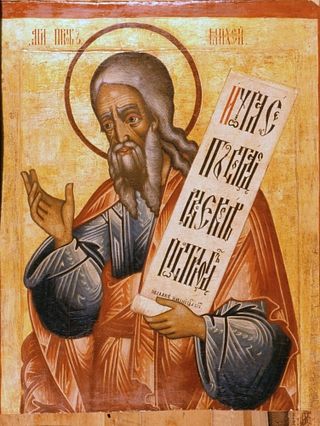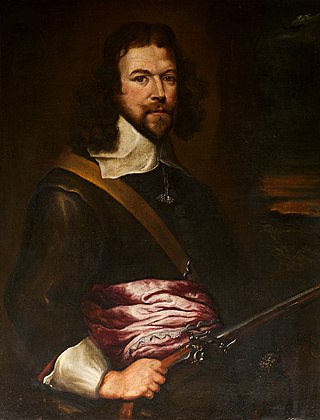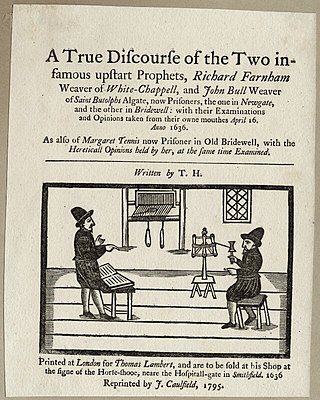Related Research Articles

In religion, a prophet or prophetess is an individual who is regarded as being in contact with a divine being and is said to speak on behalf of that being, serving as an intermediary with humanity by delivering messages or teachings from the supernatural source to other people. The message that the prophet conveys is called a prophecy.

In religion, mythology, and fiction, a prophecy is a message that has been communicated to a person by a supernatural entity. Prophecies are a feature of many cultures and belief systems and usually contain divine will or law, or preternatural knowledge, for example of future events. They can be revealed to the prophet in various ways depending on the religion and the story, such as visions, or direct interaction with divine beings in physical form. Stories of prophetic deeds sometimes receive considerable attention and some have been known to survive for centuries through oral tradition or as religious texts.

Richard Brandon was the common executioner of London from 1639 to 1649, who inherited that role from his father Gregory Brandon and was sometimes known as Young Gregory. Richard Brandon is often named as the executioner of Charles I, though the executioner's identity is not definitively known.

Elizabeth Barton, known as "The Nun of Kent", "The Holy Maid of London", "The Holy Maid of Kent" and later "The Mad Maid of Kent", was an English Catholic nun. She was executed as a result of her prophecies against the marriage of King Henry VIII of England to Anne Boleyn.
The Muggletonians, named after Lodowicke Muggleton, were a small Protestant Christian movement which began in 1651 when two London tailors announced they were the last prophets foretold in the biblical Book of Revelation. The group grew out of the Ranters and in opposition to the Quakers. Muggletonian beliefs include a hostility to philosophical reason, a scriptural understanding of how the universe works and a belief that God appeared directly on Earth as Jesus Christ. A consequential belief is that God takes no notice of everyday events on Earth and will not generally intervene until it is meant to bring the world to an end.

In religion, a false prophet or pseudoprophet is a person who falsely claims the gift of prophecy or divine inspiration, or to speak for God, or who makes such claims for evil ends. Often, someone who is considered a "true prophet" by some people is simultaneously considered a "false prophet" by others, even within the same religion as the "prophet" in question. In a wider sense, it is anyone who, without having it, claims a special connection to the deity and sets themself up as a source of spirituality, as an authority, preacher, or teacher. Analogously, the term is sometimes applied outside religion to describe someone who fervently promotes a theory that the speaker thinks is false.
Richard Montagu was an English cleric and prelate.

Lodowicke Muggleton (1609–1698) was an English religious thinker who gave his name to Muggletonianism, a Protestant sect which was always small, but survived until the death of its last follower in 1979. He spent his working life as a journeyman tailor in the City of London and was imprisoned twice for his beliefs. He held opinions hostile to all forms of philosophical reason, and had received only a basic education. He encouraged quietism and free-thought amongst his followers whose beliefs were predestinarian in a manner that was distinct from Calvinism. Near the close of his long life, Muggleton wrote his spiritual autobiography which was published posthumously.
In Islam, prophecy is the principle that God has appointed exemplary individuals, i.e. prophets and messengers to communicate His guidance to humanity. This is one of the five principles of the Twelver Principles of Religion.

Henry Burton (1578–1648), was an English puritan. Along with John Bastwick and William Prynne, Burton's ears were cut off in 1637 for writing pamphlets attacking the views of Archbishop Laud.

In Christianity, the figures widely recognised as prophets are those mentioned as such in the Old Testament and the New Testament. It is believed that prophets are chosen and called by the one God.
In Mormonism, revelation is communication from God to man. Latter Day Saints teach that the Latter Day Saint movement began with a revelation from God, which began a process of restoring the gospel of Jesus Christ to the earth. Latter Day Saints also teach that revelation is the foundation of the church established by Jesus Christ and that it remains an essential element of his true church today. Continuous revelation provides individual Latter Day Saints with a "testimony", described by Richard Bushman as "one of the most potent words in the Mormon lexicon".

According to the Hebrew Bible, Micah, also known as Micheas, was a prophet in the Bible and is the author of the Book of Micah. He is considered one of the Twelve Minor Prophets of the Hebrew Bible and was a contemporary of the prophets Isaiah, Amos and Hosea. Micah was from Moresheth-Gath, in southwest Judah. He prophesied during the reigns of kings Jotham, Ahaz, and Hezekiah of Judah.

Sir Edward Dering, 1st Baronet (1598–1644) of Surrenden Dering, Pluckley, Kent, was an English antiquary and politician.
Seventh-day Adventists believe that Ellen G. White, one of the church's co-founders, was a prophetess, understood today as an expression of the New Testament spiritual gift of prophecy.

Hanserd Knollys (1599–1691) was an English particular Baptist minister.

Cessationism versus continuationism involves a Christian theological dispute as to whether spiritual gifts remain available to the church, or whether their operation ceased with the apostolic age of the church. The cessationist doctrine arose in the Reformed theology: initially in response to claims of Roman Catholic miracles. Modern discussions focus more on the use of spiritual gifts in the Pentecostal and Charismatic movements, though this emphasis has been taught in traditions that arose earlier, such as Methodism.

John Bull was an English self-proclaimed prophet who claimed to be one of the two witnesses of the Book of Revelation, alongside Richard Farnham. Through the late 1630s and early 1640s, they established a small religious following surrounding their prophesies.
Rose Thurgood was an English religious writer, known as the author of one of the earliest English conversion narratives, "A Lecture of Repentance" (1637/8).
Cicely Johnson was an English woman living in Colchester. Her account of her conversion while under the influence of John Bull and Richard Farnham was discovered in John Rylands University Library in Manchester hundreds of years after she wrote it, in about 1636/7.
References
- 1 2 3 4 5 6 7 "Farnham, Richard". Dictionary of National Biography . London: Smith, Elder & Co. 1885–1900.